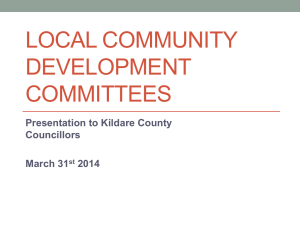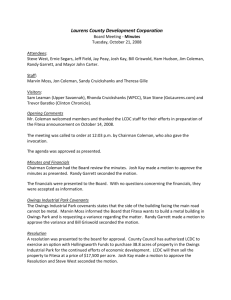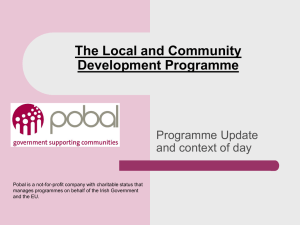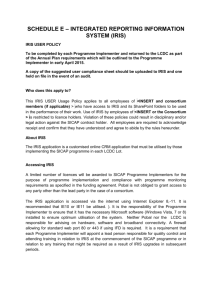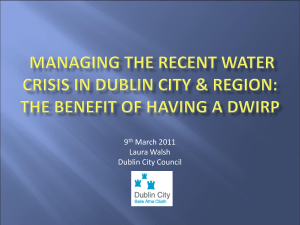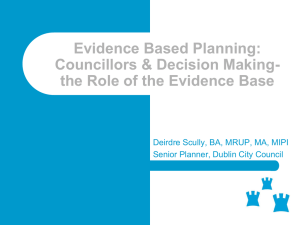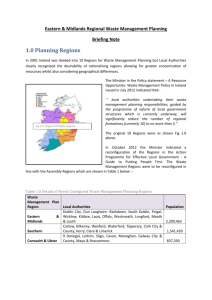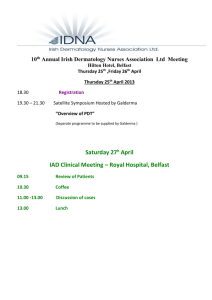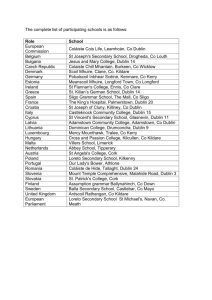now - South Dublin Community Platform
advertisement
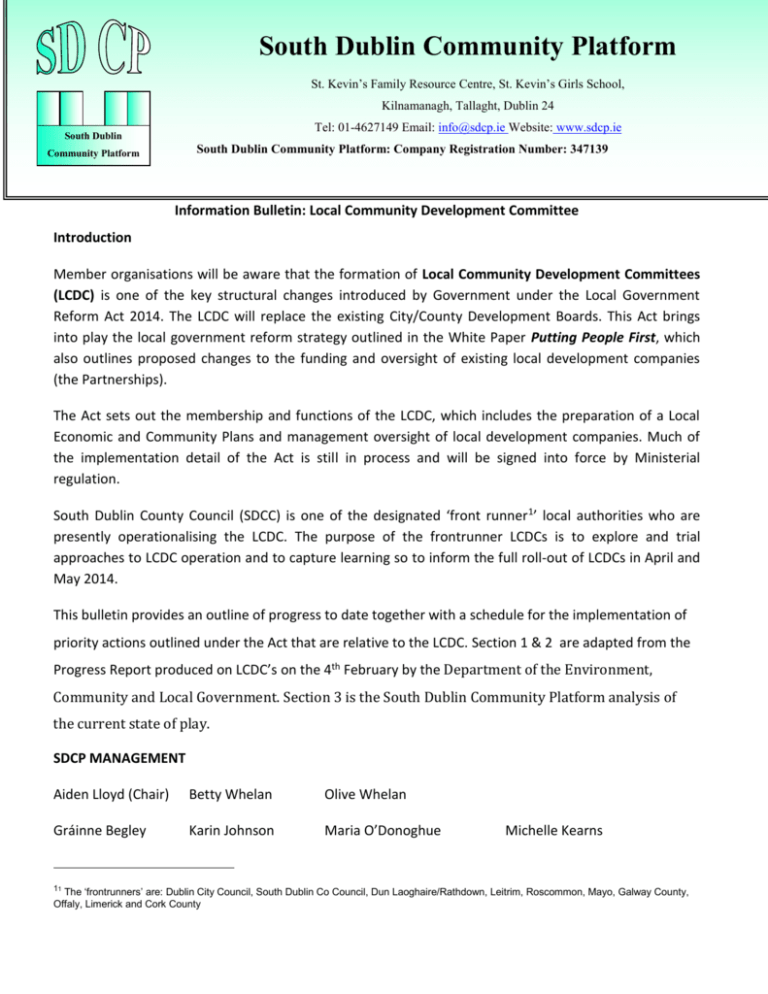
South Dublin Community Platform St. Kevin’s Family Resource Centre, St. Kevin’s Girls School, Kilnamanagh, Tallaght, Dublin 24 Tel: 01-4627149 Email: info@sdcp.ie Website: www.sdcp.ie South Dublin South Dublin Community Platform: Company Registration Number: 347139 Community Platform Information Bulletin: Local Community Development Committee Introduction Member organisations will be aware that the formation of Local Community Development Committees (LCDC) is one of the key structural changes introduced by Government under the Local Government Reform Act 2014. The LCDC will replace the existing City/County Development Boards. This Act brings into play the local government reform strategy outlined in the White Paper Putting People First, which also outlines proposed changes to the funding and oversight of existing local development companies (the Partnerships). The Act sets out the membership and functions of the LCDC, which includes the preparation of a Local Economic and Community Plans and management oversight of local development companies. Much of the implementation detail of the Act is still in process and will be signed into force by Ministerial regulation. South Dublin County Council (SDCC) is one of the designated ‘front runner 1’ local authorities who are presently operationalising the LCDC. The purpose of the frontrunner LCDCs is to explore and trial approaches to LCDC operation and to capture learning so to inform the full roll-out of LCDCs in April and May 2014. This bulletin provides an outline of progress to date together with a schedule for the implementation of priority actions outlined under the Act that are relative to the LCDC. Section 1 & 2 are adapted from the Progress Report produced on LCDC’s on the 4th February by the Department of the Environment, Community and Local Government. Section 3 is the South Dublin Community Platform analysis of the current state of play. SDCP MANAGEMENT Aiden Lloyd (Chair) Betty Whelan Olive Whelan Gráinne Begley Karin Johnson Maria O’Donoghue 11 Michelle Kearns The ‘frontrunners’ are: Dublin City Council, South Dublin Co Council, Dun Laoghaire/Rathdown, Leitrim, Roscommon, Mayo, Galway County, Offaly, Limerick and Cork County Section 1: The Local Community Development Committee (LCDC) Membership The membership of the LCDP is set down in the Act. Membership of LCDCs shall comprise both statutory and non-statutory sector members, with total membership limited to a maximum of 15 (unless otherwise agreed with DECLG). A maximum of 7 members shall be drawn from the statutory sector and a minimum of 8 members drawn from the non-statutory sector. The typical make-up of LCDCs is expected to be as follows: Elected members (3) Local authority Chief Executive or nominee (1) State agency (3) Non-statutory interests (8), including - Partnership companies - Community and voluntary interests - Social inclusion interests - Other civil society interests (business/employer interests, farming and agriculture interests, trade union interests, environmental interests, and local development or community development bodies). The Chief Officer, following consultation with the elected members (i.e. the Corporate Policy Group), will be responsible for seeking nominees to the LCDC from the relevant sectoral interests. In South Dublin County Council the LCDC membership (yet to be finalised) is: Ann Lee Ch(air): Sth Dublin Partnership Justin Byrne: Community Forum Billy Coman: South Dublin County Council Tricia Nolan: Sth Dublin Partnership Padraig Rehill: HSE Maria O’Donoghue: Sth Dublin Community Platform Pamela Kearns: Councillor Mary Corcoran: Community Interest Marie Corr: Councillor Greg Tierney: Crosscare Loman O’Byrne: Local Enterprise Office Fiona Ward: Dept. Social Protection Peter Byrne: Chamber of Commerce Paddy Lavelle: DDLETB Schedule of actions for LCDCs While SDCC, as a ‘frontrunner’, has already established its LCDC the intention is to progress the establishment of LCDCs in all local authority areas in the coming months. The table below provides a broad outline of the steps, actions and milestones in that regard (guidance will issue from DECLG to local authorities at each stage in the process) Timeline Start February 2014 Mid-February 2014 March 2014 April/May 2014 April/May 2014 Progress Update from DECLG Commence preparatory work (membership etc) for establishment of LCDCs Instructions from the Department (DECLG) to establish LCDC,. including draft regulations and guidelines Local authorities establish LCDCs by resolution and first meeting of LCDC held. LCDC commence work on preparation of community elements of Local Economic and Community Plan Responsibility for the management of contracts and funding July 2014 under the current Local Community Development Programme (LCDP) transferred from Pobal to LCDCs LCDCs develop plans for new two-year Local Community July to December 2014 Development Programme which will commence in January 2015 October/November 2014 January 2015 Community elements of Local Economic and Community Plan ready New Local Community Development Programme commences Local Economic and Community Plans A key action of the LCDC is the development of a 6 year Local Economic and Community Plan for each local authority area. The Plan will comprise two elements, an economic element to be prepared by the local authority, through the Local Enterprise Office (LEO) and a community element to be prepared by the LCDC. The two elements will be prepared separately but in parallel and with cross-consultation. Guidelines will shortly be introduced to assist the preparation of the community element of the Local Economic and Community Plan. LCDCs will then commence the preparation of the Community Plan element, which when complete will be submitted to Municipal District Councillors. Administrative supports Administrative and secretariat support for LCDCs will be provided by the local authority. A Chief Officer (and supporting staff) will be assigned by the Chief Executive (County Manager) for this purpose. Section 2: Implementation of the Local Community Development Programme and Rural Development Programme (LEADER) Oversight and management of the LCDP will transition to the LCDC as follows: Jan – June 2014 - existing contract arrangement with local development companies (Partnerships) will remain. July – Dec 2014 - management of contracts and funding transferred to LCDCs. Local Community Development Programme implementation will be undertaken by the local development companies on behalf of LCDCs. Management of contracts and funding will transfer to LCDCs from July 1st. Jan 2015 A newly designed Local Community Development Programme will be implemented under the management of the LCDC with procured implementation partners (see below). In preparation for this, LCDCs will be required to draft a 2-year programme plan for 2015/2016. This planning process should be integrated with the Local Economic and Community Plan process i.e. the same shared preparatory work, priority setting, needs analysis and consultation, etc. will inform both planning processes. A Change Management Group is being established to support the transition to ensure it is as smooth as possible. Further guidance and support (including workshops), both in regard to transitional arrangements and the development of the new Local Community Development Programme will be provided to local authorities over the coming months. Procurement and LCDP Implementation The current practice whereby implementation of the LCDP is awarded to Local Development Companies (Partnerships) is considered to be in breach of EU Competition Law and will not continue. LCDCs will have to put in place a tender process for the delivery of the new Programme. A common template for the procurement of programme delivery partners will be developed by DECLG. Role of Pobal Pobal will provide technical and administrative support to local authorities and LCDCs during the initial establishment and transitional phase in relation to the Local Community Development Programme. Support will include capacity building initiatives, management of the Local Community Development Programme contracting process (as agreed with DECLG), on-going technical support for programme deliverers (for LCDC members and relevant local authority staff), and on-going monitoring and evaluation in respect of local and community development programmes. A programme of support will be agreed between DECLG and Pobal in Q1 2014. Local authorities will be advised of these arrangements in due course. Rural Development Programme (LEADER) The Department is currently undertaking a targeted consultation exercise regarding the content of the LEADER elements of the 2014-2020 Rural Development programme and local authorities have been invited to participate in this process. The consultation process will primarily consider what actions should/could be delivered to best achieve the key priority (EU priority 6) for LEADER under the 2014-2020 programming round: Promoting social inclusion, poverty reduction and economic development in rural areas, with a focus on the following areas: Facilitating diversification, creation and development of small enterprises and job creation; Fostering local development in rural areas; Enhancing accessibility to, use and quality of information and communication technologies (ICT) in rural areas. The overall draft Rural Development Programme (RDP) for Ireland (encompassing high level targets across all areas of the programme) will be prepared and submitted to the EU Commission by end-quarter 1 of 2014 for implementation in early 2015. A call for the submission of proposals from Local Action Groups is likely to issue in the autumn and it is considered that LCDCs covering rural areas are entities eligible to submit proposals for the funding of LEADER local development strategies under the Rural Development Programme. More detailed information on the arrangements for the new LEADER programme will be provided to local authorities over the coming months. Section 3: SDCP Comment The LCDC is a key structure under the reforms outlined by the Minister in Putting People First, which in terms of community development and local development includes changes indicated in the Report of the Steering Group on the Alignment of Local Government and Local and Community Development 2011. The rationale behind these changes is: that existing community development and local development arrangements were not sufficiently accountable; that local government is democratically responsible through the local electoral process and; that local authorities have the capacity to implement what are essentially community development and local development social inclusion measures. One of the problems with representative democracy is that marginalised people are virtually invisible in terms of the outcome of electoral processes. Women are also grossly underrepresented. Participative structures such as pertain under community development and local development initiatives seek to address this democratic deficit. In terms of augmenting and enhancing local democracy there is a very good case for the creation of a body such as the LCDC as a mechanism that brings in the voice of the most marginalised. The LCDC will not operate in that manner and will therefore reflect existing power differentials. While there is some recognition that local authority capacity on matters of social inclusion is limited, the remedy proposed is that Pobal will provide a range of flanking capacity building measures. But Pobal itself has been through an enforced restructuring process which resulted in a shedding of the considerable development capacity that had been built up over successive Local Development Social Inclusion Programmes since 1990. For these reasons it is disappointing that the LCDC does not provide greater representative space to those marginalised within the representative planning and decision-making system. A significantly better social inclusion representation would also have addressed the lack of capacity on matters of social inclusion within local authorities. The timeframe for the LCDC to begin its operations is questionable, especially in relation to the development of the Community Element of the plan, in contrast to the economic element which is not mentioned in the timeframe. The Community Element is expected to be completed by October/November 2014, but there is no indication as to whether the community element will be built upon the existing foundation of needs/analysis/priorities compiled by the Partnership, Community Development Projects (CDPs) and Family Resource Centres (FRCs) or developed through an entirely fresh process. The transfer of management and funding for the Local Community Development Programme is a concern because of the likely reduction of strategic impact arising from the LCDP being subject to political populism and a resulting dissolution of funding - an issue that could be compounded by the propensity of local authorities to resist anything that doesn’t have a ‘whole community’ benefit. This could play havoc with targeted social inclusion measures. In addition, the Partnership will lose the independence that was a central part of its innovation and experimental role, which in turn informed the development of agency services and processes over many years, especially in the areas of welfare, employment and the adoption of deliberative participation processes that fostered ownership and enabled effective targeting of social inclusion measures. Enhancing the social inclusion capacity of local authorities is something that requires a strategy in its own right. Local government in Ireland is unquestionably the most underdeveloped system in Europe, with a very restricted range of responsibilities and, as a result, very little experience of the social sphere, especially social inclusion. South Dublin County Council is better than many in this respect, but it still has some way to travel. This is somewhat recognised in the Department’s LCDC strategy with Pobal earmarked to provide the remedy. However, as pointed out above, Pobal’s developmentsupport capacity has long since been stripped away when Government restructured it to an administrative role. The integration of the ‘community’ and ‘economic’ elements of what is designated a Local Community and Economic Plan, and how that will come about, is not clear when each element will be developed in a different space - development of the Community Element of the plan is a central task of the LCDC, while the economic element will be developed internally within the Council. Although there is an expressed intention to integrate both these elements within the LCDC, it is difficult to see how there can be an equivalent focus from two very different degrees of involvement. The LCDC will also assume a management, oversight and applicant role in relation to the Rural Development Programme (LEADER). Although LEADER has an explicit social inclusion objective this has not been carried forward by implementing agencies with any conviction. Hopefully, this will be taken into account by the LCDC in the contracting process. The EU Community Led Local Development (CLLD) initiative will also carry a significant package of European monies but its application in Ireland is somewhat obscure and is not specifically mentioned in LCDC documentation. CLLD can be described as an extension of the LEADER programme format applicable to urban areas with substantial populations. It is understood that this European funding will come through the Department of Education and Skills - i.e. outside the immediate remit of the Department of Environment, Community and Local Government. If the ambition of the plethora of policy directives aimed at a more coherent application of social inclusion, community development and local development policy at local level is to have any meaning then information and discussion on Community Led Local Development needs to be a topic between both the lead departments and within the LCDC. Finally, existence of a critical community development sector capable of making any meaningful input to the LCDC process will be profoundly affected if the recommendations of the Task Force on Citizen Engagement are implemented. The Minister has not yet made a decision so the report may or may not reflect the recommendation for a complex set of public participation networks that will feed representation in to local authority structures, including the LCDC. These structures could effectively undermine existing community structures and this could be exacerbated if resources were channelled towards local authority employed support staff rather than the funding of an independent community-led network.
